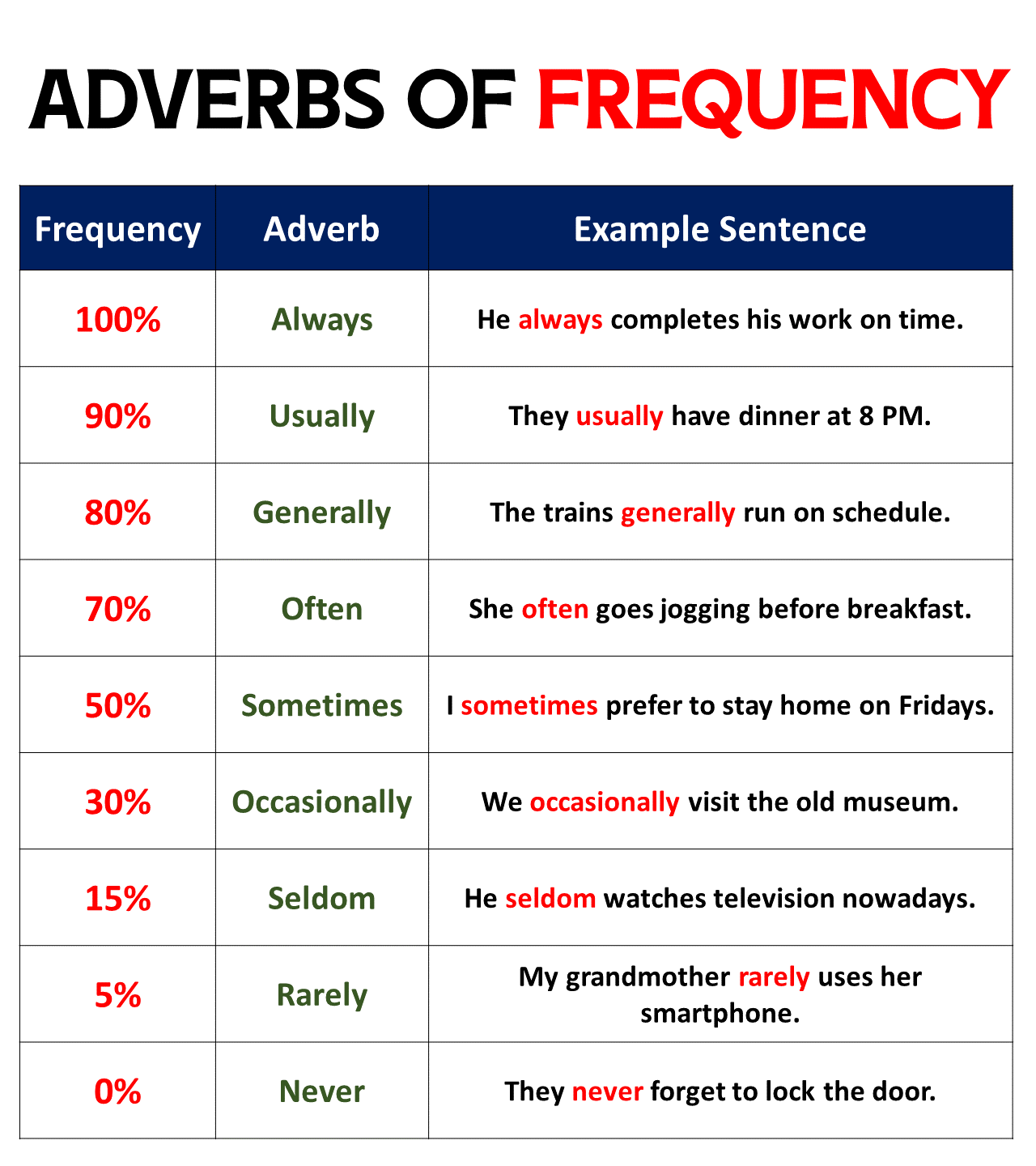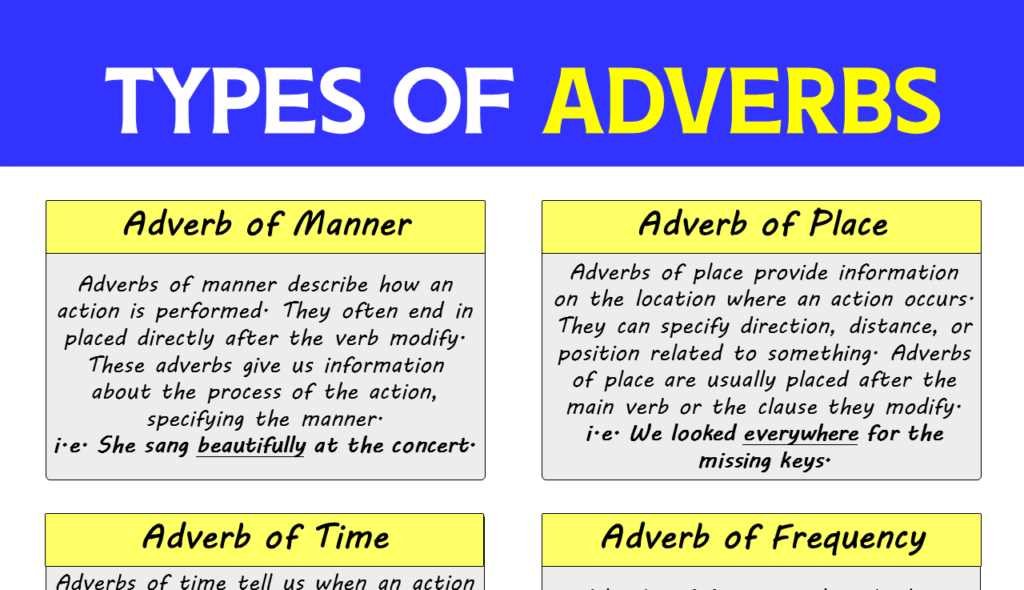Adverbs of frequency describe how often an action occurs, ranging from “always,” indicating continuous occurrence, to “never,” signifying complete absence. They provide context for the regularity of activities, typically positioned before the main verb or after the auxiliary verb in a sentence.
Adverbs of Frequency Table

9 Important Adverbs of Frequency
1. Always (100%)
The adverb “always” implies that an action is done all the time, without exception. It represents a frequency of 100%, indicating consistency and a routine that does not vary.
Example Sentences:
- She always brushes her teeth before bed.
- The store is always open on weekends.
- They always take a walk after dinner.
2. Usually (90%)
“Usually” denotes a high frequency, suggesting that an action happens most of the time but allows for occasional exceptions. It represents a general routine or common occurrence without being absolute.
Example Sentences:
- He usually drinks coffee in the morning.
- I usually read before I go to sleep.
- We usually meet up after work on Fridays.
3. Generally (80%)
“Generally” is used to express an action that is common or regular but less fixed than “always” or “usually.” It allows for more frequent exceptions and indicates a majority of the time.
Example Sentences:
- The buses generally arrive on time.
- They generally prefer homemade meals.
- She generally avoids eating late at night.
4. Often (70%)
“Often” indicates that an action happens regularly but with a fair amount of variability. It’s not as frequent as “always” or “usually” but still signifies a habitual action.
Example Sentences:
- He often goes to the gym after work.
- They often have guests over for dinner.
- She often buys fresh vegetables from the market.
5. Sometimes (50%)
The adverb “sometimes” indicates a moderate frequency. It suggests that an action happens on occasion, without any suggestion of a strong pattern or predictability.
Example Sentences:
- I sometimes skip breakfast when I’m late.
- She sometimes works from home.
- They sometimes travel abroad during the summer.
6. Occasionally (30%)
“Occasionally” signifies a low frequency. It refers to actions that happen infrequently and are not part of a regular routine.
Example Sentences:
- We occasionally go out for Italian food.
- He occasionally plays tennis on the weekends.
- She occasionally watches a movie in the cinema.
7. Seldom (15%)
“Seldom” means that an event rarely happens. This adverb is used to describe an action that occurs infrequently and is not expected as a regular event.
Example Sentences:
- He seldom visits since he moved away.
- I seldom eat fast food.
- They seldom argue about small issues.
8. Rarely (5%)
“Rarely” is similar to “seldom” but conveys an even lower frequency. It is used for actions that occur just above never happening at all.
Example Sentences:
- She rarely indulges in dessert.
- You rarely see that kind of bird in this area.
- They rarely stay up past midnight.
9. Never (0%)
“Never” signifies an absolute zero frequency. It’s used to describe something that does not happen at all.
Example Sentences:
- He never forgets his friends’ birthdays.
- They never took their wedding rings off.
- I never heard him raise his voice in anger.
Adverbs of Frequency Rules
Adverbs of frequency come with a set of rules that dictate their proper usage within sentences. Here are some key rules:
- Position in Sentence: Most adverbs of frequency are placed.
- Before the main verb: She often visits her grandparents.
- After the verb “to be”: He is always punctual.
- With Auxiliary Verbs: When a sentence contains an auxiliary verb, the adverb of frequency is generally placed after the auxiliary and before the main verb.
- They have never been to Europe.
- I can sometimes go out for a walk during lunch.
- Not with ‘To Be’: Adverbs of frequency don’t follow the above rule when the main verb is a form of “to be,” in which case they come after the verb.
- She is always happy to help.
- We are seldom late for meetings.
- Beginning or End for Emphasis: Adverbs of frequency can be placed at the beginning or end of a sentence for emphasis.
- Occasionally, we go to the theatre.
- We go to the bookstore on Saturdays, usually.
- ‘Sometimes’, ‘Often’, ‘Always’, and ‘Never’: These adverbs can also be placed at the beginning of a sentence.
- Sometimes, I prefer to walk.
- Often, they will dine at a restaurant.
- ‘Never’ and Negative Constructions: “Never” is a negative word and should not be used in a sentence with other negatives to avoid double negatives.
- Incorrect: I don’t never study.
- Correct: I never study.
- Avoiding Double Emphasis: When using adverbs of frequency, avoid using additional frequency expressions that convey the same meaning, as this is redundant.
- Incorrect: I always frequently exercise in the mornings.
- Correct: I always exercise in the mornings.
- ‘Every’ Phrases: Phrases with “every” (e.g., “every day”, “every week”) are not adverbs, but they serve a similar function to adverbs of frequency and follow the same sentence placement rules.
- She visits her family every Sunday.
Remember, the nuances of language mean that while these rules are standard, there are exceptions and stylistic choices that may alter how these adverbs are used. It’s also important to consider the flow and clarity of the sentence when applying these rules.
Adverbs of Frequency Exercises
Fill in the blanks with the correct adverb of frequency from the list: always, usually, often, sometimes, rarely, seldom, never, generally, occasionally.
- I __________ go jogging in the morning before work.
- She __________ eats meat; she’s a vegetarian.
- They __________ have dessert after dinner, only on special occasions.
- We __________ watch TV late at night; we prefer reading.
- My brother __________ misses his football practice.
- He __________ helps with the dishes after dinner.
- The garden __________ looks so green and fresh in the spring.
- You __________ call your grandparents; they would love to hear from you more often.
- She __________ forgets to send us a postcard when she travels.
- They __________ arrived late to the meeting; it’s quite unusual for them.


